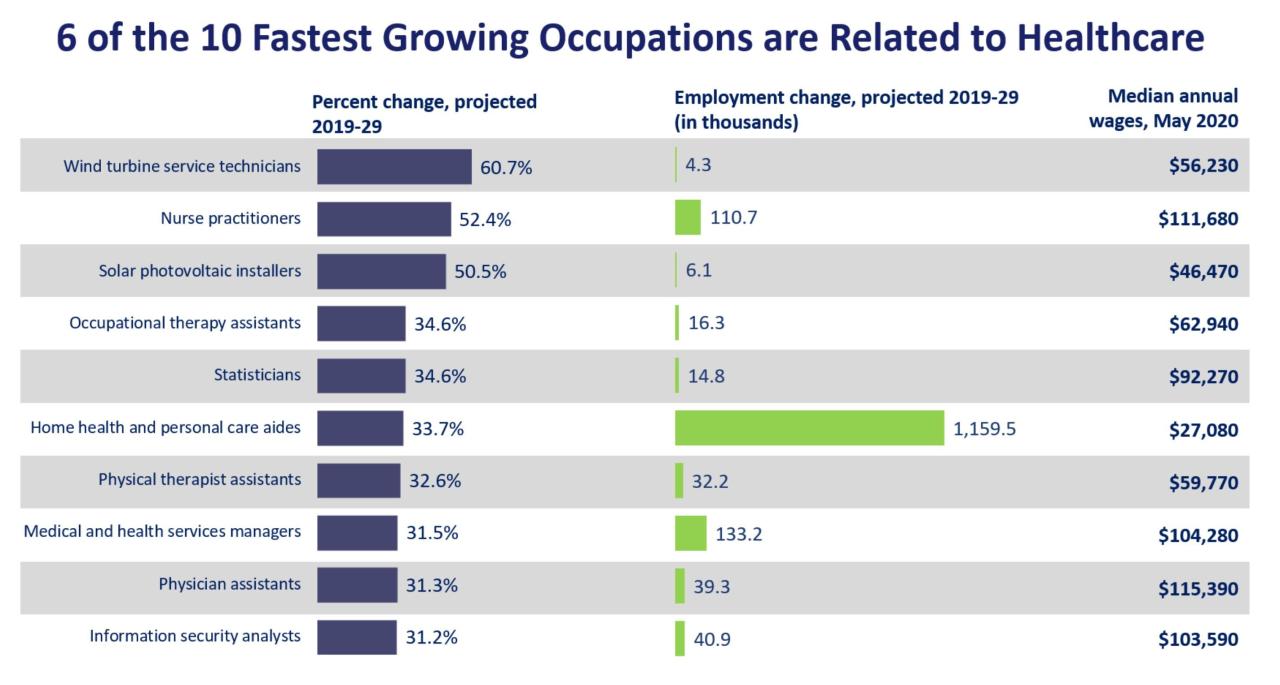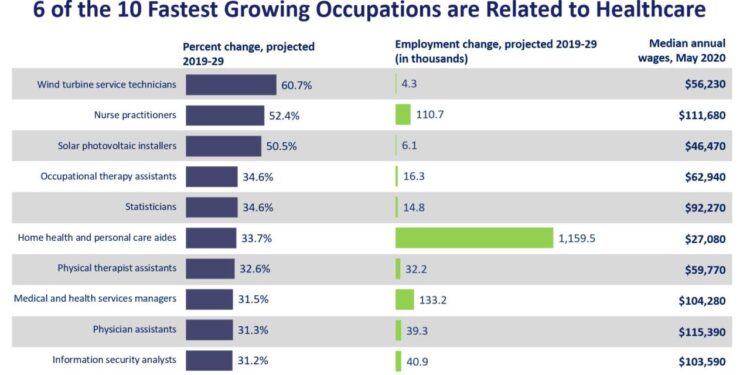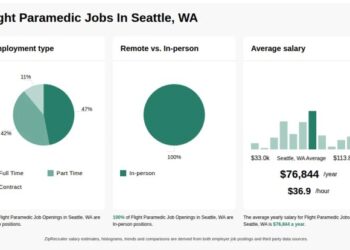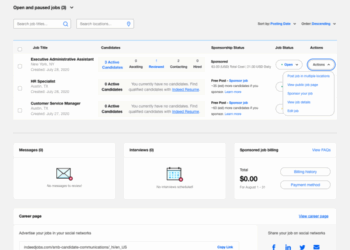Exploring the top healthcare jobs in demand worldwide, this guide delves into the factors driving the high demand for these professions and the projected growth in the coming years.

Top healthcare jobs in demand worldwide
Healthcare is a rapidly growing field with various professions in high demand globally. Let's explore the top healthcare jobs that are currently sought after by employers.
Registered Nurses
Registered Nurses are integral to the healthcare system, providing direct patient care and collaborating with other healthcare professionals. Factors contributing to the high demand for Registered Nurses include an aging population, increased chronic illnesses, and the need for specialized care.
- Projected growth: The demand for Registered Nurses is expected to grow by 7% from 2019 to 2029, faster than the average for all occupations.
- Opportunities: Registered Nurses can work in various settings such as hospitals, clinics, nursing homes, and community health centers.
Physicians and Surgeons
Physicians and Surgeons play a crucial role in diagnosing and treating patients' medical conditions. The demand for these healthcare professionals is driven by population growth, advancements in medical technology, and the increasing prevalence of chronic diseases.
- Projected growth: The employment of Physicians and Surgeons is projected to grow by 4% from 2019 to 2029.
- Specializations: Physicians and Surgeons can specialize in various areas such as cardiology, oncology, pediatrics, and surgery.
Medical and Health Services Managers
Medical and Health Services Managers oversee healthcare facilities, ensuring efficient operations and quality patient care. The demand for these professionals is influenced by the growing complexity of healthcare systems and the need for effective management.
- Projected growth: Employment of Medical and Health Services Managers is expected to grow by 32% from 2019 to 2029, much faster than the average for all occupations.
- Responsibilities: Medical and Health Services Managers are responsible for budgeting, staffing, compliance with regulations, and overall strategic planning.
Nursing as a top healthcare job
Nursing is considered one of the top healthcare jobs in demand worldwide due to the essential role nurses play in providing direct patient care, promoting health education, and advocating for patients' well-being. Nurses are integral members of healthcare teams, working in various settings such as hospitals, clinics, nursing homes, and community health centers.
Different Specializations in Nursing and their Demand
- Registered Nurse (RN): RNs are the most common type of nurses and are in high demand globally. They provide and coordinate patient care, educate patients and the public about various health conditions, and offer emotional support to patients and their families.
- Advanced Practice Registered Nurse (APRN): APRNs, including nurse practitioners, nurse anesthetists, and nurse midwives, have advanced education and training, allowing them to diagnose and treat patients, prescribe medications, and manage overall patient care.
- Specialty Nurses: Nurses specializing in areas such as critical care, oncology, pediatrics, and mental health play crucial roles in providing specialized care to patients with specific health needs. These nurses are in demand for their expertise in managing complex conditions.
Educational Requirements for Pursuing a Career in Nursing
Individuals interested in pursuing a career in nursing typically need to complete a nursing program and obtain a nursing license. The educational requirements may vary based on the desired nursing role:
- Registered Nurse (RN): To become an RN, individuals can complete a diploma program, an associate degree in nursing (ADN), or a bachelor's degree in nursing (BSN). Passing the NCLEX-RN exam is required to obtain a nursing license.
- Advanced Practice Registered Nurse (APRN): APRNs need to complete a master's or doctoral degree in nursing, along with specialized training in their chosen advanced practice role
. They must also pass a national certification exam in their specialty.
- Specialty Nurses: Nurses interested in specializing in a particular area may need to pursue additional certifications or training programs to enhance their knowledge and skills in that specific field.
Medical Technologists and Technicians
Medical technologists and technicians play a crucial role in the healthcare industry by performing various laboratory tests, analyzing samples, and assisting physicians in diagnosing and treating patients. They are responsible for operating and maintaining medical equipment, as well as documenting and interpreting test results.
Role of Medical Technologists and Technicians
Medical technologists and technicians are essential in conducting tests like blood tests, urine tests, and genetic testing to help doctors make accurate diagnoses. They also play a key role in ensuring the quality and accuracy of test results, which are vital for patient care and treatment.
- Collecting, analyzing, and interpreting samples
- Operating and maintaining laboratory equipment
- Documenting and reporting test results
- Collaborating with healthcare professionals to ensure proper patient care
Skills and Qualifications
To work as a medical technologist or technician, individuals typically need a bachelor's degree in medical technology or a related field. They should also possess strong attention to detail, analytical skills, and the ability to work effectively under pressure. Certification from a recognized organization may also be required for certain positions.
- Strong analytical and critical thinking skills
- Attention to detail and accuracy
- Ability to work well under pressure
- Excellent communication and teamwork skills
Advancements in Technology
Advancements in technology have significantly impacted the demand for medical technologists and technicians. With the introduction of automated testing equipment and digital record-keeping systems, the need for skilled professionals who can operate and maintain these technologies has increased. Additionally, the growing focus on personalized medicine and genetic testing has created new opportunities for medical technologists and technicians to specialize in cutting-edge areas of healthcare.
- Increased use of automated testing equipment
- Digitalization of medical records and test results
- Opportunities for specialization in personalized medicine and genetic testing
Physician Assistants (PAs)
Physician Assistants (PAs) play a crucial role in healthcare settings by providing patient care under the supervision of physicians. They are trained to perform various tasks such as taking medical histories, conducting physical exams, ordering and interpreting tests, diagnosing illnesses, and developing treatment plans.
Responsibilities of PAs
- Collaborate with physicians to provide comprehensive patient care.
- Perform procedures and treatments under physician supervision.
- Educate patients on managing their health conditions.
- Prescribe medications in some states or under physician supervision.
Comparison with Doctors and Nurses
- Physician Assistants work under the supervision of physicians, while doctors make independent medical decisions.
- PAs have a more direct patient care role compared to doctors who focus on diagnosis and treatment planning.
- Nurses provide bedside care and support to patients, while PAs have a broader scope of practice in diagnosing and treating patients.
Increasing Demand for Physician Assistants
Physician Assistants are in high demand globally due to the shortage of primary care physicians and the need for accessible healthcare services. PAs are cost-effective providers who can help bridge the gap in healthcare delivery, especially in underserved areas. The versatility and adaptability of PAs make them valuable assets in various medical settings, contributing to the growing demand for their services worldwide.
Last Recap
Concluding our discussion on top healthcare jobs in demand worldwide, this guide provides valuable insights into the most sought-after healthcare professions globally.
Query Resolution
What are the educational requirements for nursing careers?
The educational requirements for nursing careers typically include a bachelor's degree in nursing (BSN) or an associate degree in nursing (ADN) from an accredited institution.
How do physician assistants differ from doctors and nurses in their roles?
Physician assistants work under the supervision of physicians, but they can perform many tasks that doctors do, such as diagnosing patients, prescribing medications, and assisting in surgeries. They have more autonomy than nurses but less than doctors.
What advancements in technology are impacting the demand for medical technologists and technicians?
Advancements in medical technology, such as AI and robotic surgery, are increasing the demand for skilled medical technologists and technicians who can operate and maintain these sophisticated systems.











